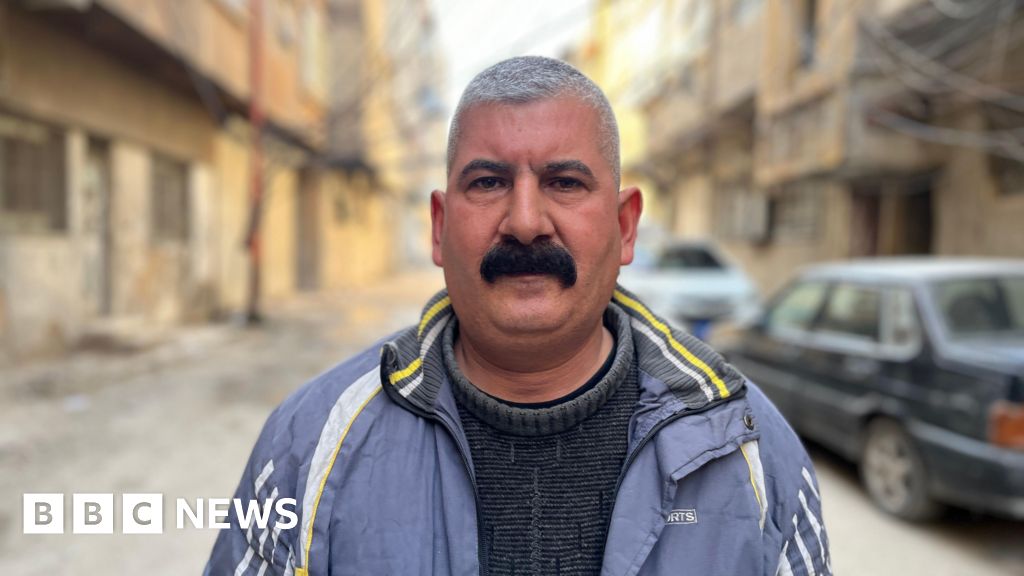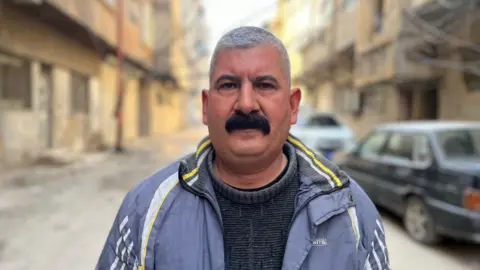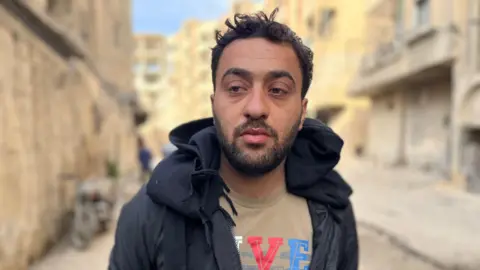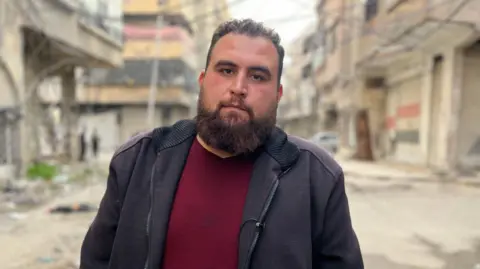Physical Address
304 North Cardinal St.
Dorchester Center, MA 02124
Physical Address
304 North Cardinal St.
Dorchester Center, MA 02124

 Aamir Peerzada/BBC
Aamir Peerzada/BBCTawfiq Diam is excited because it is the first time he can speak freely about what happened to his family in 2018 in Douma, in the Eastern Ghouta suburb of Damascus.
“If I had spoken earlier, Bashar al-Assad’s forces would have cut out my tongue. They would have cut my throat. We were not allowed to speak,” he says.
Tawfiq’s wife and four children aged between eight and 12, Joudy, Mohammed, Ali and Qamar, were killed in a chemical attack on 7 April 2018.
The Organization for the Prohibition of Chemical Weapons (OPCW), a global watchdog, said in a report last year that it believed a Syrian air force helicopter took off from the nearby Dumayr air base shortly after after 7:00 p.m. that day and dropped two yellow cylinders that hit two apartment buildings, releasing highly concentrated chlorine gas.
Tawfiq said his family was outside their house on the ground floor when the bombs fell.
“I heard an explosion and people were shouting in the streets ‘chemicals, chemicals’. I ran out. There was a foul smell. I saw yellow foam coming out of people’s mouths. My children could not breathe, they were suffocating. I saw people lying in the street,” he says.
The OPCW says at least 43 people were killed. Tawfiq says there were more than 100 deaths.
“Even I almost died. I was in the hospital for 10 days. Only five or six men in that compound survived,” he says.
Assad’s government denied ever using chemical weapons. And its ally Russia said the Douma attack was “staged”.
Eastern Ghouta was one of the most heavily contested areas for five long years during Syria’s civil war.
The regime eventually besieged it and, along with its ally Russia, bombed the area indiscriminately as it sought to wrest control from rebel fighters led by the Jaish al-Islam group.
Driving through it now, the destruction wrought upon it is all around us. It is hard to find a single building that does not bear the scars of war, many bombed so badly that they are just shells of structures.
On more than one occasion in Eastern Ghouta, chemical weapons – prohibited by the Geneva Protocol and the Chemical Weapons Convention – were used to attack Douma.
Bashar al-Assad’s forces captured Douma shortly after the chlorine attack, and the victims’ stories were never fully heard.
“Not a day goes by that I don’t think about my children,” Tawfiq says, pulling out the only photo he has of them, his eyes brimming with tears.
 Aamir Peerzada/BBC
Aamir Peerzada/BBCAs we talk to Tawfiq, more people come up to us to tell us their stories.
Khalid Naseer says his daughter Nour, two-year-old son Omar and pregnant wife Fatima also died in the 2018 chlorine attack.
“Those who were killed were mostly children and women.”
The anger that has had to be suppressed for six years comes out.
“The whole world knows that Bashar al-Assad is an oppressor and a liar, and that he killed his own people. My wife was killed two days before she was due to give birth to our baby,” he cries, with high emotions
The chlorine gas attack was not the only time chemical weapons were used in the area.
In 2013, rockets containing the nerve agent sarin were fired at several rebel-held suburbs in eastern and western Ghouta, killing hundreds of people. UN experts confirmed the use of sarin but were not asked to assign blame.
Assad denied that his forces had fired the rockets, but agreed to sign the Chemical Weapons Convention and destroy Syria’s declared chemical arsenal.
Between 2013 and 2018, Human Rights Watch documented at least 85 chemical weapons attacks in Syria, accusing the Syrian government of being responsible for most of them.
In addition to Douma in 2018, the OPCW Investigation and Identification Team has identified the Syrian army as the perpetrator of four other cases of chemical weapons use in 2017 and 2018. It was found a previous fact-finding mission, which was not mandated to identify the perpetrators. chemical weapons have been used in 20 cases.
Khalid and Tawfiq took us to a mound on the side of a road, a short drive away. They believe this is where the regime took the bodies of their family and buried them in a mass grave.
Looking on the ground, among gravel, mud and stones, you can see pieces of bones, although it is not possible to say whether they are human remains.
“This is the first time I’ve come here, I swear to God. If I had tried to come here before, they (the regime) would have executed me,” says Tawfiq.
“On Eid, when I was missing my family, I would walk by the side of this road and look quickly towards this (mound). It made me cry.”
Tawfiq wants the graves exhumed so he can give his family a dignified funeral.
 Aamir Peerzada/BBC
Aamir Peerzada/BBC“We want new investigations into the attack,” says Khalid. He says the testimony given by many to the OPCW fact-finding mission in 2019 was unreliable.
It is an assertion corroborated by Abdul Rahman Hijazi, one of the eyewitnesses who testified before the mission, who says he was forced to give the regime’s version of events.
“Intelligence agents arrested me and told me to lie. They told me that they kill people by inhaling dust and not by chemicals. They threatened me that if I didn’t agree, my family she won’t be safe. They told me my house was surrounded by regime men,” he said.
One of the conclusions of the 2019 OPCW report on Douma reads: “Some witnesses stated that many people died in hospital on 7 April as a result of heavy shelling and/or suffocation due to smoke and dust inhalation”.
Abdul Rahman says he and his family were shunned by the community for years after he testified. It was hard for him to find a job.
Now he also wants a new investigation.
“I want the truth to come out. I can’t sleep. I want justice for all parents.”
Additional reporting by Aamir Peerzada, Sanjay Ganguly and Leen Al Saadi